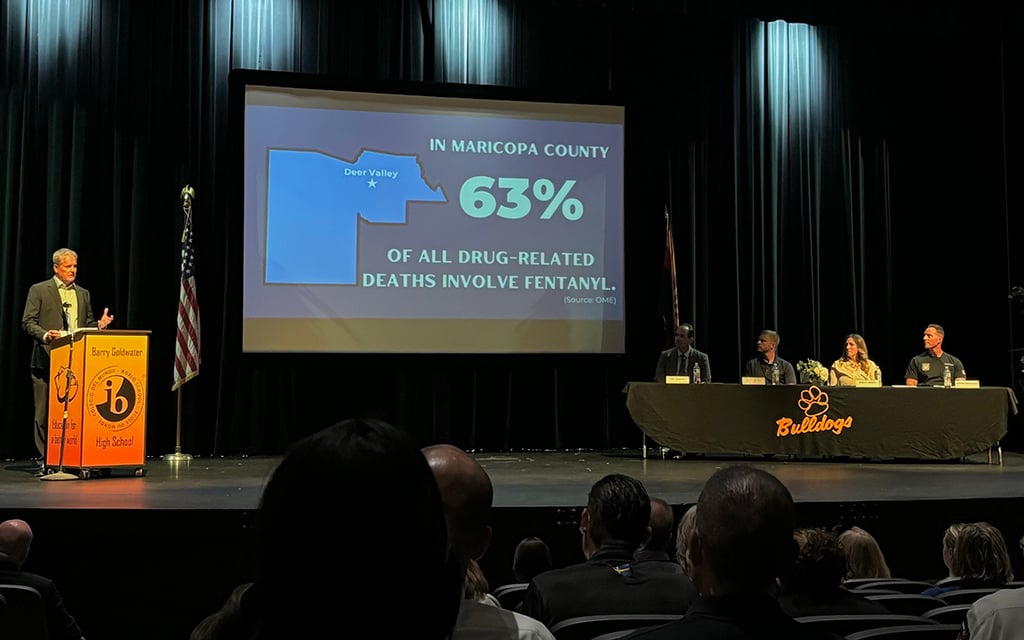PHOENIX – Arizona’s Department of Education has introduced an initiative aimed at tackling the growing threat of fentanyl in schools. The School Training Overdose Preparedness and Intelligence Taskforce (STOP-IT) is educating students and school staff and working to prevent fentanyl-related incidents statewide.
Fentanyl overdoses have become a critical issue in Arizona, particularly among young people.
“Last year, 70% of the pills that we seized contained a lethal dose,” said Cheri Oz, special agent in charge of the Drug Enforcement Administration’s Phoenix Field Division. “You had a seven out of 10 chance of taking a pill … for the very first time and not surviving.”
Gustavo Ayala lost his 17-year-old son, Noah Ayala, in March to a fentanyl overdose.
“This is a crisis that knows no boundaries, geographic, economic or demographic. It has affected families and every corner of society, including my own,” Ayala said during a panel discussion about the fentanyl crisis at Barry Goldwater High School last month.
In Arizona, five people die every day from opioid overdoses, according to data collected by the state Department of Health Services. “It’s not just the victims that die from the usage, it’s the people who die from the handling and transporting and the people that are caught between all of that,” Phoenix police Officer Kenneth Silvia said during the panel.
With rising concerns from parents, educators and students about the threat of fentanyl, the STOP-IT Task Force is stepping in to provide schools with proactive measures, such as naloxone to address overdoses as well as pamphlets and assemblies to educate students.

In Maricopa County, 63% of all drug-related deaths involve fentanyl, Maricopa County Supervisor Clint Hickman, left, said at the Fighting Fentanyl Together: Community Forum on Sept. 12, 2024. (Photo by Sienna Monea/Cronkite News)
STOP-IT is also designed as a collaborative approach. Organizations such as Terros Health and the Mayo Clinic are offering support.
“If you’re able to prevent an overdose-related death, then there’s hope for the future for that person to be able to make different choices,” said Dr. Vanna Campion, chief medical officer of Terros Health in an interview. “Our involvement is really about just preventing as many overdose-related deaths as possible, educating people about the importance of naloxone and being a part of the solution.”
Naloxone is a medicine to reverse opioid overdoses commonly used by first responders and can be purchased over the counter at pharmacies. The task force is supplying schools with the medication and informing teachers and nurses at schools how to administer it.
Campion said Arizona communities are directly affected as the state serves as a major entry point for the drugs into the U.S. According to Maricopa County, fentanyl deaths in the county have increased by 4,900% since 2015 and has overtaken meth as the deadliest drug in Arizona. In Maricopa County, 63% of all drug-related deaths involve fentanyl, Maricopa County Supervisor Clint Hickman said at the panel.
Arizona Superintendent of Public Instruction Tom Horne has also promoted the Sold Out Youth Foundation, a nonprofit providing schools with interactive materials on fentanyl dangers, health, wellness and fitness education. The paid platform includes a fentanyl education curriculum designed for all ages.
The foundation’s CEO, Roman Gabriel III, emphasized the importance of addressing the stigma surrounding fentanyl in an interview.
“One of the problems with fear is stigma. Lack of information and misinformation causes fear. What we’ve done is overcome the No. 1 problem with getting the messaging out about fentanyl, and it’s the stigma of talking about it,” Gabriel said, noting the organization goes to schools across the country and holds assemblies and talks to ensure open communication between students and parents.


